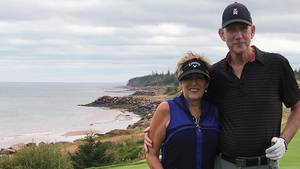Robert Parker is a busy man. While he recently stepped back from his work as owner of West River Greenhouses, nothing truly slows him down. Not even a prostate cancer diagnosis during the height of COVID-19.
Robert, who currently serves as warden of Pictou County, is a politician, farmer, entrepreneur and community volunteer, to name a few. In 2021, he underwent a robotic prostatectomy performed by the QEII’s Dr. Ross Mason and the da Vinci robot.
The robot, known as the da Vinci X surgical system, was entirely donor-funded by the QEII Foundation, with 2,300 donors contributing $8.1 million to the project.The technology includes four robotic arms and a 3D camera to help surgical teams perform the most minimally-invasive cancer surgeries possible.
For Robert’s procedure, the robot was controlled by Dr. Mason at a nearby console. The technology translated his hand movements in real-time — bending and rotating surgical instruments in ways the human hand cannot achieve.
“Even the most talented surgeon can be limited by the size and mobility of their hand,” says Dr. Mason. “This robotics technology changes that and, as a result, offers many advantages to patients, like less pain, less blood loss and an easier recovery with smaller incisions.”
While his surgeon explained the many benefits of robot-assisted surgery, Robert says he was still surprised to see the impact firsthand.
“The morning after my prostate cancer surgery, I went home,” says Robert. “It was absolutely amazing.”
According to Robert, the “smaller cuts” enabled by the robot and Dr. Mason’s expertise meant it wasn’t long before he was back to his busy life.“I’m always on the go, so the shorterrecovery time was really great,” he says. “It meant I was back in the greenhouses, attending council meetings and playing with my grandkids much quicker — you can’t put a price on that.”
It’s a sentiment echoed by Dr. Mason, who’s part of the QEII team that’s performed over 800 robotic cancer surgeries — treating patients living with prostate, kidney, gynecologic and ear, nose and throat (ENT) cancers. February 2023 marks the four-year anniversary of Atlantic Canada’s first robot-assisted surgery.
“This technology allows us to provide world-class, state-of-the-art care to our patients,” says Dr. Mason. “It was one of the most exciting days of my career when I was able to offer and perform the first robotic procedures in our region.”
Donor impact is felt with every procedure performed with the QEII’s da Vinci robot; both in the OR and the cancer journey and recovery that follows.
This March, Robert and his wife, Colleen, will celebrate their 48th wedding anniversary. He’s cancer-free and enjoying every moment with his family. Something he doesn’t take for granted.
“Before they wheeled me into the OR, all I thought about was my family, especially my grandchildren,” he recounts. “They needed me to beat this thing, and that’s what got me through.”
The QEII Health Sciences Centre is no stranger to robot-assisted surgery, with the Halifax hospital currently home to four surgical robots. To date, 4,395 donors have invested in surgical robotics through the QEII Foundation’s We Are campaign; a milestone that has resulted in nearly 1,000 robot-assisted surgeries performed at the QEII since February 2019.








